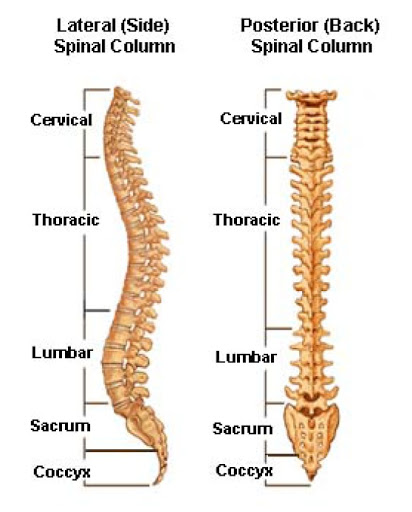Spinal pain
Spinal pain is a description of pain arising from any part of the spinal column. The spinal column is comprised of 5 main segments, and pain is described in terms of the area of where the pain is felt.
The commonest presentation is lumbar or ‘low back’ pain, followed by cervical or ‘neck pain’. The other areas of the spine (thoracic, sacral and coccygeal) are less frequently associated with pain.
Low back pain is pain, or stiffness in the lower back with or without leg pain (sciatica). If this is left untreated, it can be debilitating and may have a significant impact on your quality of life

Back pain in some form or another is very common, affecting about 80% of people, who will experience low back pain at some stage of their life. In the vast majority of cases, this is a self-limiting condition and not due to any serious disease. Around 60% of individuals with acute low back pain will recover in 6 weeks and up to 80% – 90% recover within 12 weeks. If the pain persists for greater than 3 months, it is considered as chronic low back pain.
In the UK, there are approximately 1.6 million new cases of chronic back pain every year.
Chronic back pain is a relatively common condition and in the majority of cases, the cause of pain is not obvious. In this case, if the pain cannot be linked to an conditions such as trauma, infection or tumour, is it known as mechanical or non-specific back pain.
Back pain is best managed as a partnership between the patient and the therapist, with the emphasis being on active rehabilitation. The focus of this approach is core stability exercises and self help. However prescription medications or injection treatments may be needed to break the pain cycle and facilitate this rehabilitation in those are struggling to make progress with conservative management.
will i need a scan for my back pain?
The majority of cases of back pain are mechanical or non specific i.e. pain arising from the intervertebral discs, facet joints, muscles or other structures in the spine, and in these cases, a CT or MRI scan is not necessary, and indeed, is not recommended.
However, although this is rare, there can be more serious conditions causing the pain, where a scan is needed to guide future treatment decisions.
To help me decide if you need a scan, there are certain ‘red flag’ indicators in your medical history that I will ask you about.
These ‘red flags’ include:-
- Previous history of malignancy
- Aged under 16 or over 50 years with new onset of pain
- Unexplained weight loss
- Longstanding steroid use
- Saddle anaesthesia
- Reduced anal tone
- Generalised neurological deficit
- Progressive spinal deformity
- Urinary retention
- Non-mechanical pain (night pain, pain at rest)
- Thoracic pain
- Fever/ rigors
- General malaise
As part of the initial assessment, I will ask about these ‘red flags’ to help me make a judgement as to whether a scan is necessary. If I consider a scan is necessary, I can organise this for you during the consultation, and in many cases can be done on the same day.
This may lead to a referral to a spinal surgeon for an opinion regarding future treatment options, but this happens only on a very small minority of cases.
will i need surgery for my back pain?
Approximately 98 percent of back pain patients are diagnosed with non-specific back pain in which no serious underlying pathology is identified. Therefore, for the vast majority of cases of back pain, surgery is not indicated nor required. The latest NICE (NG59) guidelines state that surgery should not be considered for mechanical (non-specific) low back pain.
What can I expect on from my consultation?
A thorough assessment of your pain including
- A detailed medical history concentrating on your back pain
- A thorough spinal and neurological examination
- If indicated, rapid radiological investigations including MRI scans, CT scan or X-Rays
- Rapid access to appropriate management to facilitate recovery
- Access to psychological support in desired
What treatments are offered for back pain?
All treatments are offered in conjunction with the latest National Institute for Clinical Excellence (NICE) guidelines (Low back pain and sciatica in over 16s: assessment and management (NG59 Nov 2016)
Initial treatments offered include medical management and access to physiotherapy.
Access to psychological support is also available
Other treatments for low back pain may include:
- Radiofrequency denervation techniques
- Facet joint injections with cortisone (steroid) can be considered
- Sacroiliac joint injections with steroid
- Lumbar epidural injections with steroid (for sciatica pain)
- Nerve root blocks with steroid (for sciatica pain)

Click Below For more info on spinal injections
Other frequently seen chronic pain conditions
i am happy to consult on a number of other chronic pain conditions, including:-
- Spinal Pain (Low back or neck)
- Chronic headache (Including chronic migraine)
- Sciatica
- Fibromyalgia
- Neuropathic Pain (Nerve pain)
- Sacroiliac Joint Pain
- Widespread joint (Arthritic) pain
- Myofascial Pain (Muscle pain)
- Trochanteric Bursitis
- Knee Pain
- Chronic Facial Pain
- Post Surgical Pain
- Trigeminal Neuralgia
- Whiplash Injury
- Post Hepretic Neuralgia (Shingles pain)
- Adhesive Capsulitis (Frozen Shoulder)
- Chronic Abdominal Wall Pain (ACNES)
- Coccygeal Pain
- Painful Diabetic Neuropathy (PDN)
- Plantar Fascitis


